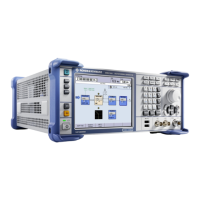Remote Control Basics
R&S
®
SMBV100A
395Operating Manual 1407.6062.32 ─ 08
TCPIP::host address::port::SOCKET
where
●
TCPIP designates the network protocol used
●
host address is the IP address or host name of the device
●
LAN device name defines the protocol and the instance number of a sub-instrument:
– inst0 selects the VXI-11 protocol (optional, default)
– hislip0 selects the newer HiSLIP protocol
●
INSTR indicates the instrument resource class (optional)
●
port determines the used port number
●
SOCKET indicates the raw network socket resource class
Example:
●
Instrument has the IP address 192.1.2.3; the valid resource string using VXI-11 pro-
tocol is:
TCPIP::192.1.2.3::INSTR
●
The DNS host name name is RSSM1; the valid resource string is:
TCPIP::RSSM1::hislip0 (HiSLIP)
TCPIP::RSSM1::INSTR (VXI-11)
●
A raw socket connection can be established using:
TCPIP::192.1.2.3::5025::SOCKET
Identifying instruments in a network
If several instruments are connected to the network, each instrument has its own IP
address and associated resource string. The controller identifies these instruments by
means of the resource string.
6.1.3.1 HiSLIP Protocol
The HiSLIP (High Speed LAN Instrument Protocol) is the successor protocol for VXI-11
for TCP-based instruments specified by the IVI foundation. The protocol uses two TCP
sockets for a single connection - one for fast data transfer, the other for non-sequential
control commands (e.g. Device Clear or SRQ).
HiSLIP has the following characteristics:
●
High performance as with raw socket network connections
●
Compatible IEEE 488.2 support for Message Exchange Protocol, Device Clear,
Serial Poll, Remote/Local, Trigger, and Service Request
●
Uses a single IANA registered port (4880), which simplifies the configuration of fire-
walls
●
Supports simultaneous access of multiple users by providing versatile locking mech-
anisms
●
Usable for IPv6 or IPv4 networks
Remote Control Interfaces and Protocols

